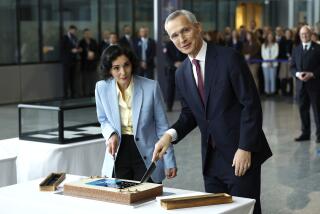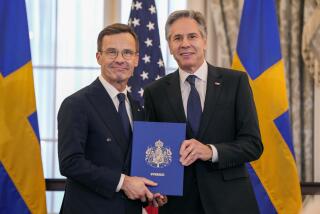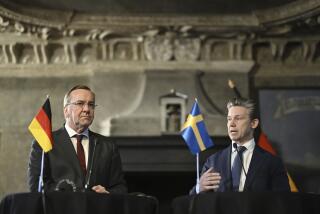NATO Offers to ‘Extend the Hand of Friendship’ to Moscow, Its Allies : Diplomacy: The Western Alliance says it welcomes the Warsaw Pact’s move toward ‘constructive cooperation.’
Foreign ministers of the North Atlantic Treaty Organization offered Friday to “extend the hand of friendship” to the Soviet Union and its Warsaw Pact allies.
A communique from the 16-member Western Alliance said they welcomed the declaration of the Warsaw Pact meeting in Moscow on Thursday expressing the readiness for “constructive cooperation” with NATO countries.
“We are encouraged by the positive spirit conveyed in this declaration and in particular by the readiness on the part of the countries issuing it for constructive cooperation.”
NATO Secretary General Manfred Woerner, in closing the two-day meeting on the west coast of Scotland, declared that the “message of Turnberry” was future “friendly and cooperative” relations with the Soviet Union.
However, at a news conference, Woerner turned down suggestions that NATO should invite members of the Warsaw Pact to join the Western Alliance. Such initiatives should come from the individual nations themselves, he said.
“We leave it to them to decide the future of the Warsaw Pact,” Woerner. “We leave it to them to decide on membership in the (NATO) alliance.
Woerner said suggestions that NATO and the Warsaw Pact nations make a joint declaration were premature, since the pact has not completed its “re-evaluation” of its future.
Secretary of State James A. Baker III said the foreign ministers had been “laying the foundation” for next month’s NATO summit meeting in London. At that gathering, the leaders of the Western Alliance are expected to chart a new course for NATO adopting a military strategy geared to a greatly lessened threat from the Soviet Union and increasing the political dimension of the alliance.
Baker also praised the NATO statement extending the hand of friendship to the Soviet Union and Eastern European nations.
The NATO communique gave the “highest priority” to reaching a conventional arms accord (CFE) in Vienna by the end of the year and Baker indicated that the alliance approved U.S. proposals on reduction of armor and aircraft as well as verification procedures in those talks.
It called for talks on the reduction of short-range nuclear weapons in Europe as soon as a CFE agreement is completed in Vienna.
Until then, it insisted on an “appropriate mix” of conventional and nuclear forces in the alliance, “at the lowest levels consistent with our security needs.”
Once again, NATO declared that German unification is a “major contribution to stability in Europe” and supported a unified Germany’s freedom to chose its alliance membership.
On the touchy issue of Lithuania, the ministers said “it is our understanding that the leaders of Lithuania and the Soviet Union have indicated their willingness to begin a dialogue upon the suspension--and not retraction” of the Lithuanian declaration of independence.”
More to Read
Start your day right
Sign up for Essential California for news, features and recommendations from the L.A. Times and beyond in your inbox six days a week.
You may occasionally receive promotional content from the Los Angeles Times.






